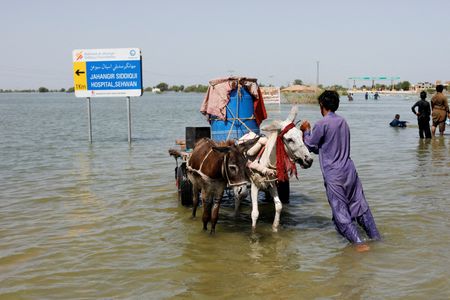By Marc Jones
LONDON (Reuters) – Countries hit by climate change-driven disasters such as flooding and hurricanes will automatically be able to freeze debt payments under new plans laid out by the bond market rule setting International Capital Market Association (ICMA).
Devastating flooding in Pakistan has pushed it to the brink of debt crisis in recent weeks and there are growing fears that far more countries will suffer more frequent catastrophes as global warming continues.
ICMA’s move on Wednesday introduced new “climate resilient debt clauses” (CDRCs) that countries can now plug into the government bonds they sell to raise money on the international capital markets.
They are the result of a UK-convened working group that included G7 governments as well as the International Monetary Fund, World Bank and major U.S and European banks, investment firms and lawyers.
Any country that uses them will be able to defer their debt payments for a maximum of 2 years, with the aim of giving them enough financial breathing space to provide aid and support to affected populations.
“As well as supporting disaster resilience by freeing up cash flow, CRDCs could help avoid the liquidity challenges faced by low-income countries in such circumstances becoming costly payment defaults,” ICMA said.
CRDCs are already used in Caribbean countries like Barbados and Granada which are regularly battered by hurricanes. The hope of the working group is that other nations in the Pacific, Africa and Central and Southeast Asia will now use them too.
ICMA said while technically no country is excluded from using CRDCs, they were likely to be most suitable for low-income countries, Small Island Developing States, or other developing countries particularly vulnerable to climate change.
Leland Goss, ICMA’s General Counsel said the hope is that they will be timely with a wave of countries now facing debt crises in the wake of the COVID pandemic and sharply rising debt levels and interest rates.
As well as flooding and hurricanes, earthquakes, tsunamis and droughts would all be covered by the clauses.
“If sovereign borrowers can avoid default at the time of a natural catastrophe, this will benefit both affected countries but also their creditors and the global financial system,” Goss said.
(Reporting by Marc Jones;Editing by Elaine Hardcastle)

